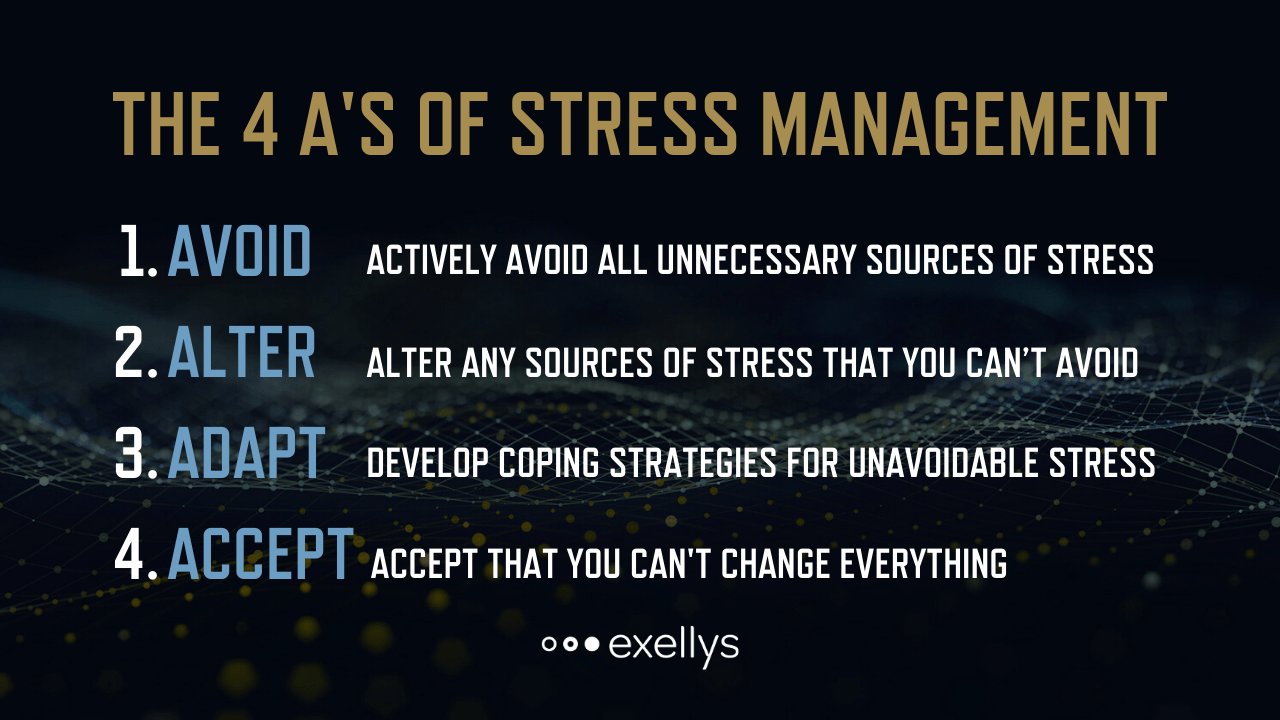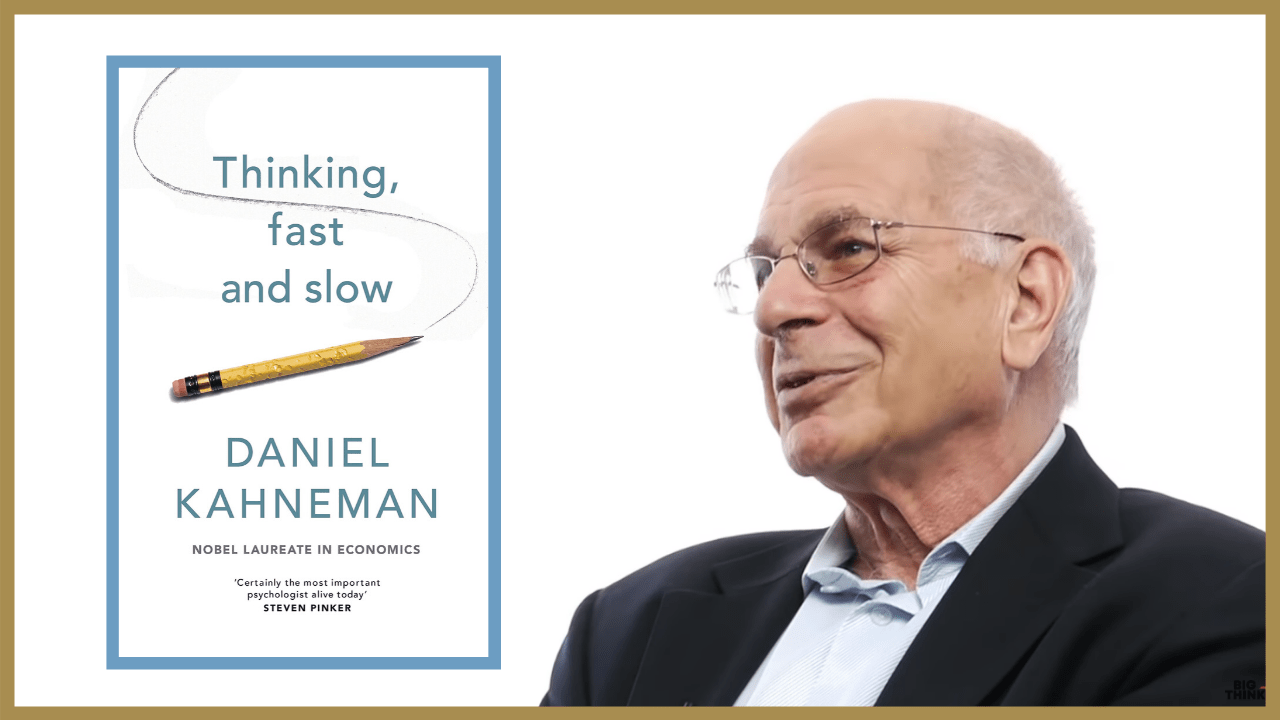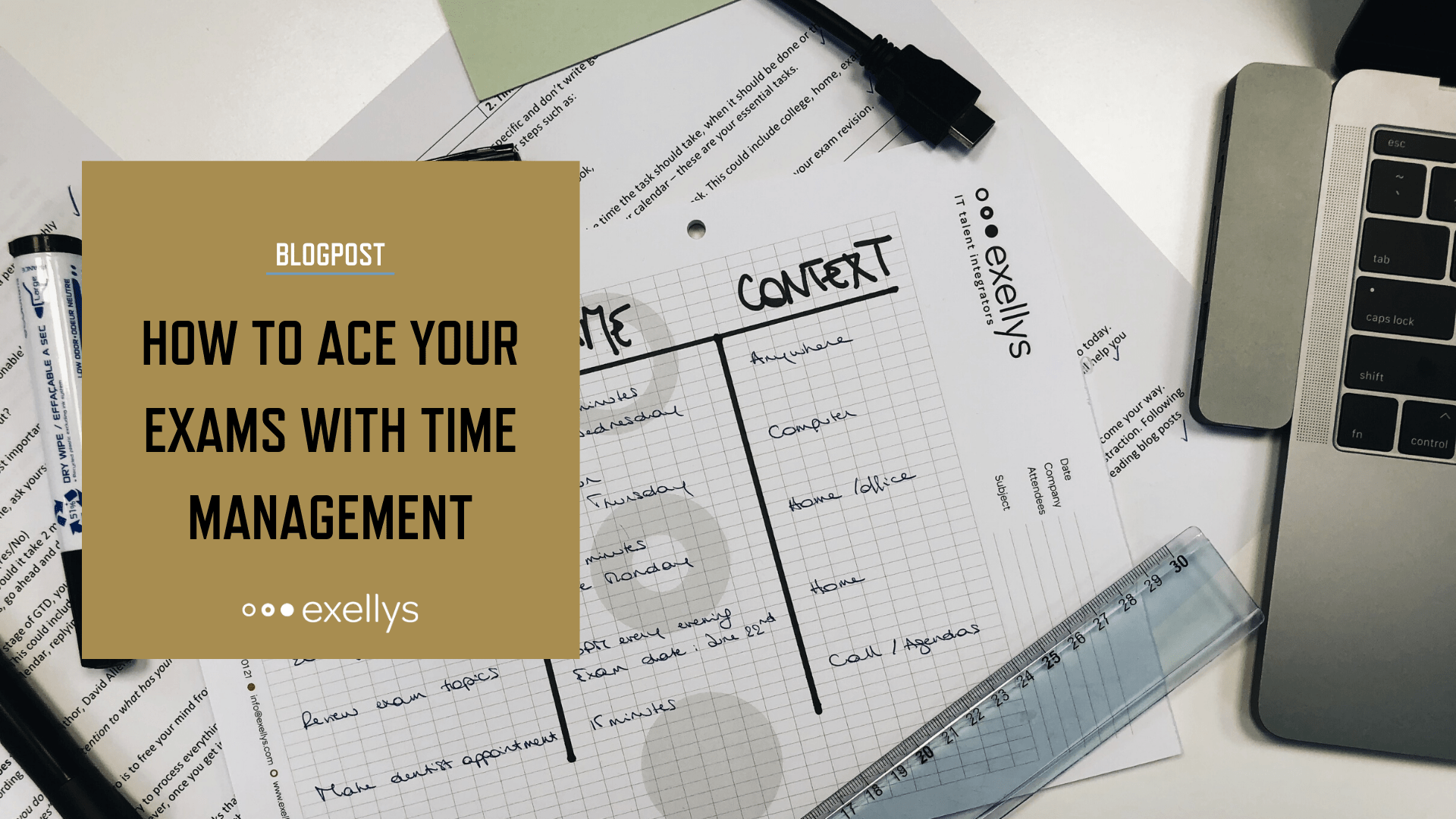How to handle (exam) stress
on 8 June 2020 for GraduatesWhether you’re facing finals this June or working hard to make the first important deadline of your career, it’s natural to feel overwhelmed with stress every once in a while. But it’s important to remember that everyone’s in the same boat and you certainly aren’t alone! That’s why we wanted to offer you our most effective tips and strategies for handling exam stress. These ideas will help get you going and stay cool, calm and focused!

The two main ways to deal with stress
First, it’s important to understand that there are two main approaches to coping with stress. One way is to change your situation through things like planning your revision schedule, getting regular exercise, eating healthy and cutting out distractions. The second way is to change yourself and improve the way you react to stress. We’ll be looking at both of these approaches, but each one requires you to start with one simple step…
Identify the sources of your stress
Surely, the exam season is what’s making you feel stressed, right? Well yes, that’s true, up to a certain point. But there’s likely more than just exams weighing on your mind. So, try to ‘unpack’ your situation and figure out precisely what’s stressing you out. It might be the stress of having to cram for your finals. But it might equally be that you’re stressed about the deadline for a group project. Or anxious about getting the results you need. Or worried about job applications. Or a combination of all of those things.
It’s not always as straightforward as you might first have thought! Once you identify the sources of stress, you’ll be better at handling them.
Keep a stress journal
If you’re not quite sure about what’s causing you problems, try keeping a ‘stress journal’ for a week. Set aside five minutes every day to jot down what’s making you stressed. After a week, you’ll have a pretty clear idea about all the sources of stress in your life and this will help you formulate a plan to deal with it!
Change your situation
The first approach to handling exam stress involves changing your situation. Find what’s causing you stress and change it. Simple. The approach we recommend is something called the 4 A’s of Stress Management; Avoid, Alter, Adapt, and Accept. The first two are about changing your situation – so let’s look at these two first!

Avoid
Your first step is to actively avoid all unnecessary sources of stress. Draw up a revision schedule to ensure that you focus on all the essential things. Then make a ‘to-do’ list and prioritize the most important things. This will help you with time management. Avoid people and places that stress you out. Learn to say “No” to people who want to waste your time. Focus on things you ‘must’ do and drop all the things you don’t have time for. If you have too many extracurricular commitments, drop some or find ways to cut back.
Alter
Your second step is trying to alter any sources of stress that you can’t avoid. Be open and express how you’re feeling instead of bottling everything up inside. If your girlfriend or boyfriend is hassling you to go out instead of study, turn them down. If your roommate is being too noisy or disrupting your revision time, have a word.
If you’re feeling overwhelmed with revision, try to create a more balanced schedule that gives you plenty of time to revise for exams and plenty of time to unwind. Your brain works best in short ‘chunks’ of time, so schedule in set times for rest, relaxation, and exercise. Remember that no matter how hectic exam prep becomes, social interaction is critically important. You should always leave time for regular heart-to-hearts with a trusted friend or family member who knows how to listen and empathize.
Change yourself
The second approach to dealing with exam stress involves changing yourself. This is where the other two A’s come in – Adapt and Accept. Here’s how to implement them.
Adapt
The third step – Adapt – is all about developing coping strategies to deal with the unavoidable sources of stress in your life, such as project deadlines and exam dates. Changing your attitudes and expectations can help you regain a sense of control. For example, if you’re a perfectionist, you can make a conscious effort to relax, see the bigger picture and think more positively about what you can do, instead of all the areas you fall short. Focusing on progress, not perfection can really help you manage the stress of exams!
Accept
The last step – Accept – is perhaps the most important aspect of handling exam stress. But it’s also the hardest to implement. Here’s what it means. Stress is an unavoidable part of life, and how you deal with it is what really matters. If you’re like most people, you have probably been conditioned to believe that stress is bad, and harmful for your health. People under a lot of stress have high blood pressure and are more likely to die younger, right? Well, the latest research into stress, cited by Stanford psychologist Kelly McGonigal, indicates that this is only true for people who believe that stress is harmful.
Make friends with stress
If you train yourself to see signs of stress – such as an elevated heart rate, deeper breathing, and more adrenaline – as helpful, you’ll learn to develop a healthier response to stress. Your blood vessels will stay relaxed. Your heart will still be pounding, but on a cardiovascular level, your body’s response will be similar to how you are during moments of joy.
You see, alongside adrenaline, your body also releases oxytocin – aka the ‘cuddle’ hormone – when you become stressed. This makes you reach out for social interaction and human contact. This is exactly what you need when you’re stressed about exams. You need support and guidance. Not only is this healthier, but it also helps you recover faster, too!
Use stress to revise better
You may be wondering, “How do I actually do this?” Well, the next time you catch yourself panicking about an upcoming exam date or project deadline, notice your body’s reaction. Your heart is beating faster. Your breathing is up. You feel wired and alert. Make a conscious effort to think about these responses as helpful. Think of them as your body’s way of helping you to prepare better for the exams. Embrace these changes and use them to your advantage.
Slow down your thinking
The last strategy for handling exam stress is based on a theory by Nobel prize winner Daniel Kahneman called Thinking Fast and Slow. According to Kahneman, we all have two modes of thought: System 1 Intuition and Instinct – which is fast, and System 2 Rational thinking which is slower and more measured.

While we use both systems to make decisions, System 1 usually takes the upper hand and causes us to make suboptimal decisions, leading to stress. The solution? Schedule a ‘slow thinking time’ once per day. Use this time to make a ‘done’ list so you can see everything you’ve accomplished. This helps you get out of the ‘fast’ System 1 type of thinking and lets you engage your Rational thinking. It gives you perspective and forces you to reflect and take stock.
No thanks!
That’s a wrap. We hope this made your upcoming finals a bit easier and if this was your final hurdle before graduation, you might want to check this blogpost out next…
About Exellys
Exellys is a Tech Talent Incubator. We match ambitious companies with the finest tech talent. Are you ready to drive the innovations of tomorrow? Ready to make an impact and become a future-fit digital leader?
Whether you are a graduate or (young) professional, Exellys will unlock your full potential by guiding you to a challenging work environment that perfectly matches your personality, expectations and ambitions.
On top of that, you are enrolled in one of our very own training and coaching programs. This means that, while working as an Exellys consultant, we are helping you to bridge your ambition to excellence.
Through intensive training and coaching, you’ll gain the essential skills, competencies and knowledge necessary to become the highly effective professional you aim to be.
Become an Exellyst and get in touch with us today!
Tags: exams , stress management





